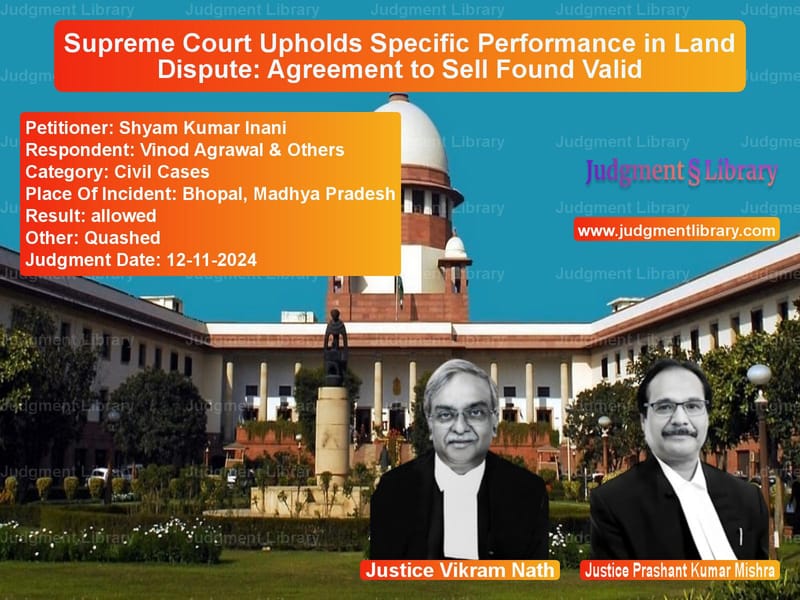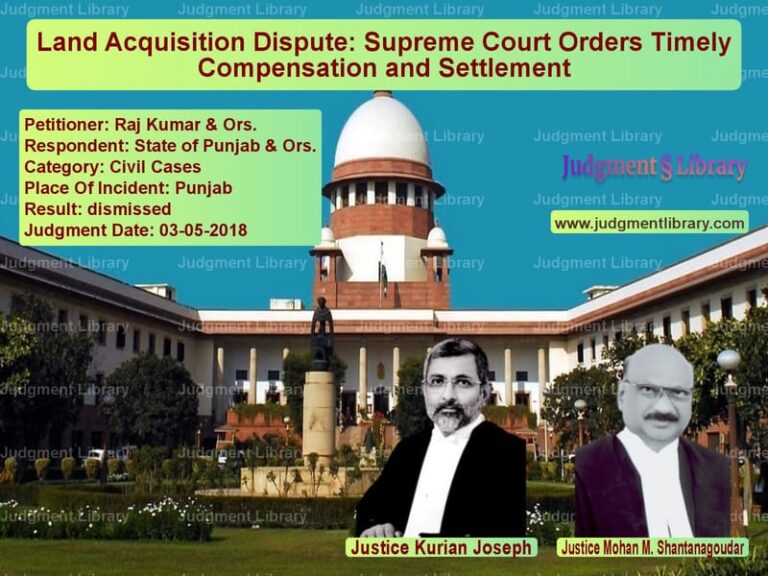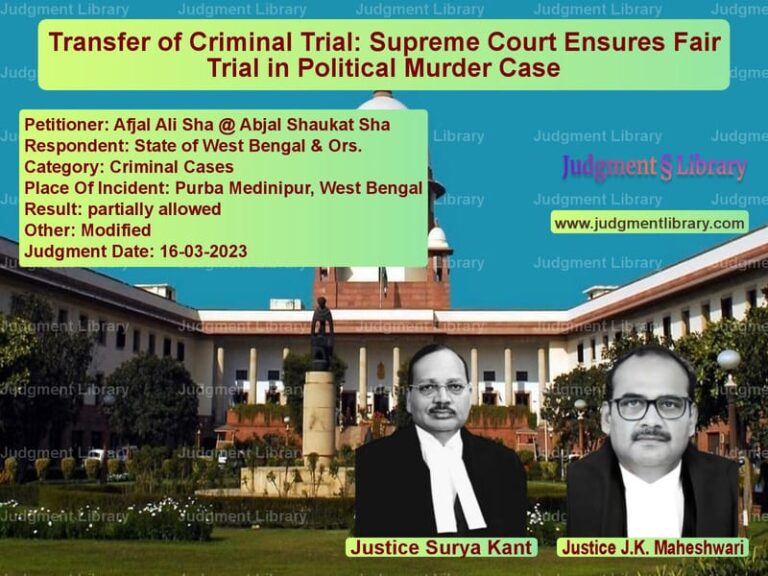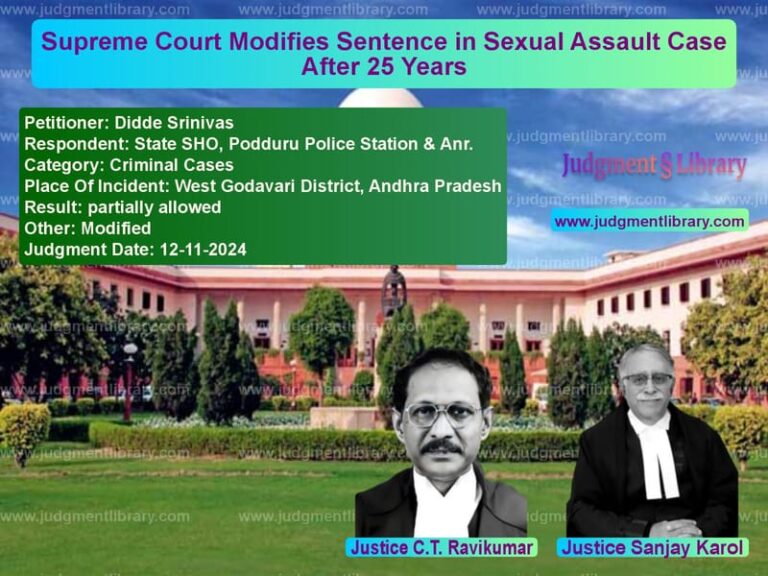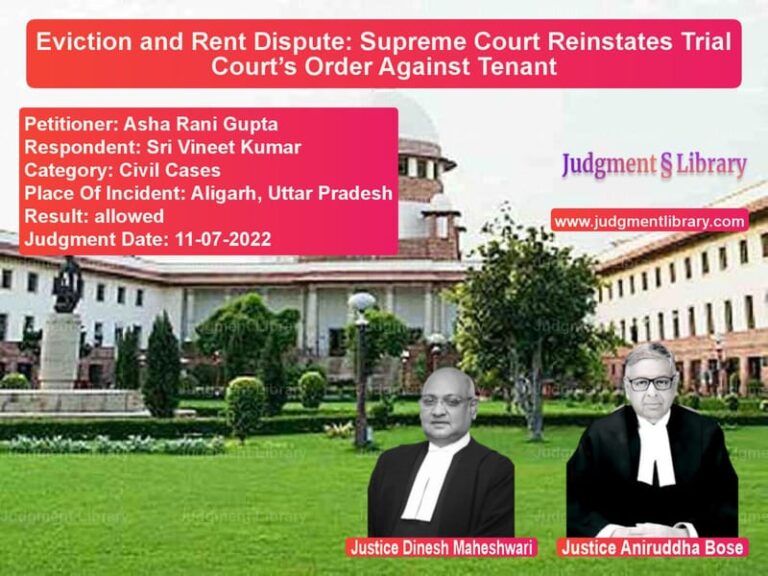Supreme Court Upholds Specific Performance in Land Dispute: Agreement to Sell Found Valid
The Supreme Court of India recently delivered a significant judgment in the case of Shyam Kumar Inani v. Vinod Agrawal & Others, addressing a long-standing land dispute involving specific performance of an agreement to sell. The Court ruled in favor of the plaintiffs, overturning the High Court’s decision and restoring the Trial Court’s judgment that upheld the validity of the agreement. This case highlights critical legal principles regarding specific performance, limitation periods, bona fide purchasers, and the burden of proof in property disputes.
Background of the Case
The dispute revolved around a plot of agricultural land measuring 23.98 acres in Village Godar Mau, Tehsil Huzur, District Bhopal. The land originally belonged to Sushila Devi, who had purchased it through a registered sale deed in 1966. The plaintiffs, who were in possession of the land, claimed that Sushila Devi had entered into separate agreements to sell various portions of the land to them on August 30, 1990, after receiving full sale consideration. However, after her death in 1992, her legal heirs refused to execute the sale deeds in favor of the plaintiffs.
Despite repeated requests and legal notices, the legal heirs declined to honor the agreements, instead seeking to mutate the property in their names. The plaintiffs then filed suits for specific performance, seeking enforcement of the agreements to sell. The defendants denied the validity of the agreements, alleging forgery, fraud, and misrepresentation.
Trial Court Ruling
The Trial Court ruled in favor of the plaintiffs, holding that:
- The agreements to sell were validly executed and had been duly proved.
- The plaintiffs had paid the full sale consideration at the time of execution.
- The plaintiffs were in possession of the land since 1990 and had been cultivating it.
- The defendants failed to prove their allegations of fraud and forgery.
- The plaintiffs were ready and willing to perform their part of the contract.
- The subsequent sale deeds executed by the defendants in favor of third parties were null and void.
The Trial Court directed the legal heirs of Sushila Devi to execute the sale deeds within two months and restrained them from alienating the property further.
High Court’s Reversal
The High Court overturned the Trial Court’s ruling, dismissing the suits on the following grounds:
- The agreements to sell were unregistered and lacked clear boundary descriptions.
- The plaintiffs failed to enter the witness box, instead relying on their power of attorney holder.
- The suit was barred by limitation as it was filed more than three years after Sushila Devi’s death.
- The defendants’ claim of fraud and misrepresentation was plausible.
- The plaintiffs failed to prove their readiness and willingness to perform the contract.
Supreme Court’s Observations and Verdict
The Supreme Court examined the evidence and legal principles in detail and reinstated the Trial Court’s findings. The key observations were:
1. Validity of the Agreement to Sell
The Court noted that the plaintiffs had provided substantial evidence to prove the execution of the agreements. The documents were signed in the presence of witnesses, and the plaintiffs possessed the original title deeds of 1966 and the rin pustika, confirming the transfer of ownership rights. The agreements, though unregistered, were legally enforceable.
2. Readiness and Willingness of the Plaintiffs
The Court rejected the High Court’s finding that the plaintiffs were not ready and willing to perform their part of the contract. The plaintiffs had paid the full sale consideration at the time of execution and had repeatedly requested the defendants to complete the sale deeds. The plaintiffs’ possession of the land and their payment of land revenue further demonstrated their intent.
3. Limitation Period
The Court clarified that the limitation period for specific performance begins when the seller refuses to perform the contract. In this case, the cause of action arose in 1994 when the defendants refused to execute the sale deeds. Since the suit was filed in 1995, it was well within the three-year limitation period.
4. Power of Attorney as a Witness
The Supreme Court disagreed with the High Court’s adverse inference drawn from the plaintiffs’ absence from the witness box. The Court held that a power of attorney holder who has personal knowledge of the transaction can testify on behalf of the principal. Since K.D. Maheshwari, who was one of the purchasers, had testified, his statements were legally admissible.
5. Fraud and Forgery Claims
The Court emphasized that the burden of proving fraud lay on the defendants. The defendants failed to produce any substantial evidence to support their claims. The handwriting expert examined by the defendants could not conclusively prove that the signatures on the agreements were forged.
6. Sale Deeds Executed in Violation of Injunction
The Supreme Court noted that the defendants had executed sale deeds in favor of third parties despite a court injunction restraining them from doing so. Such actions demonstrated their mala fide intent and warranted the cancellation of these sale deeds.
7. Rights of Subsequent Purchasers
The Court held that any subsequent purchasers of the property could not claim better rights than the original vendors. Since the legal heirs of Sushila Devi had no right to sell the property, the purchasers acquired no legal title.
Conclusion
The Supreme Court allowed the appeals, restored the Trial Court’s judgment, and directed the defendants to execute the sale deeds in favor of the plaintiffs. The judgment reinforces critical legal principles regarding the enforcement of agreements to sell, the burden of proof in fraud allegations, the limitation period for specific performance, and the rights of bona fide purchasers. This ruling provides clarity on the obligations of sellers and ensures that valid agreements are upheld in accordance with the law.
Petitioner Name: Shyam Kumar Inani.Respondent Name: Vinod Agrawal & Others.Judgment By: Justice Vikram Nath, Justice Prashant Kumar Mishra.Place Of Incident: Bhopal, Madhya Pradesh.Judgment Date: 12-11-2024.
Don’t miss out on the full details! Download the complete judgment in PDF format below and gain valuable insights instantly!
Download Judgment: shyam-kumar-inani-vs-vinod-agrawal-&-othe-supreme-court-of-india-judgment-dated-12-11-2024.pdf
Directly Download Judgment: Directly download this Judgment
See all petitions in Contract Disputes
See all petitions in Property Disputes
See all petitions in Specific Performance
See all petitions in Landlord-Tenant Disputes
See all petitions in Damages and Compensation
See all petitions in Judgment by Vikram Nath
See all petitions in Judgment by Prashant Kumar Mishra
See all petitions in allowed
See all petitions in Quashed
See all petitions in supreme court of India judgments November 2024
See all petitions in 2024 judgments
See all posts in Civil Cases Category
See all allowed petitions in Civil Cases Category
See all Dismissed petitions in Civil Cases Category
See all partially allowed petitions in Civil Cases Category

